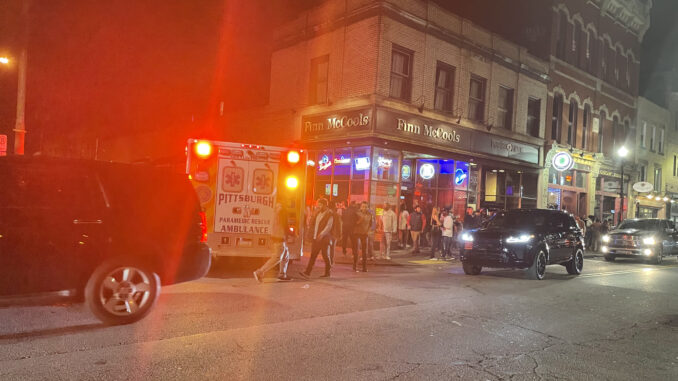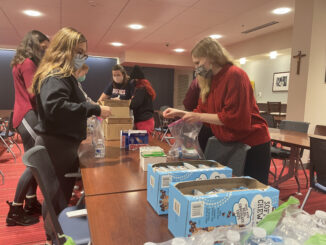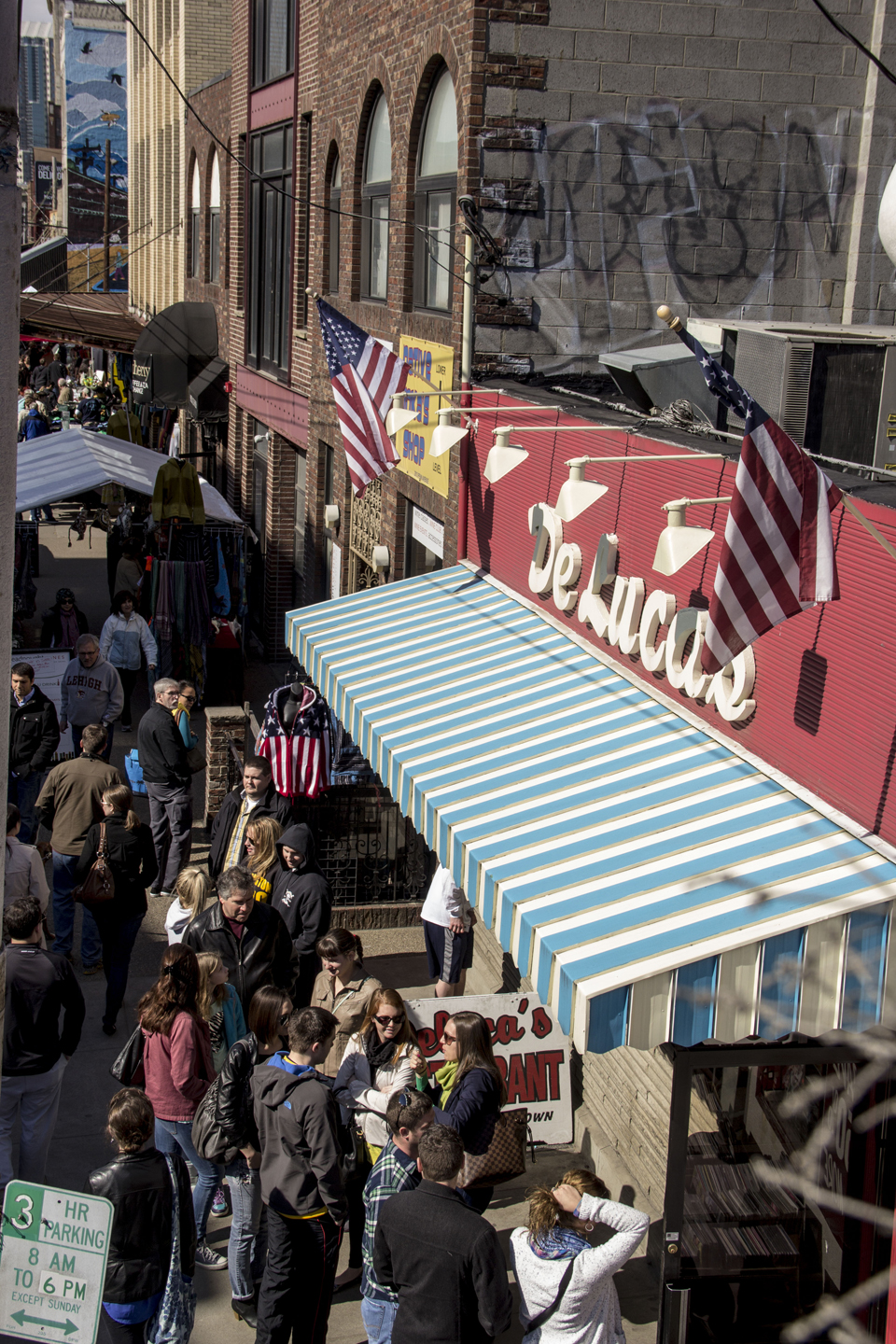
Colleen Hammond | editor-in-chief
Oct. 28, 2021
“The first thing that went through my head was total fear,” said Duquesne senior Bridget Bove as gunshots rang out near her apartment in the South Side last week.
“It sounded like it was right outside,” Bove said.
Bove, although a devotee of South Side living, like many other students has observed a noticeable increase in dangerous situations over the past few months.
Despite the citywide decline in crime over the past decade, the recent uptick in gun violence in the South Side flats has provoked concerns over personal safety for some residents.
Bove is not alone in her up-close encounters with the growing gun problem in the South Side. In May, senior Anthony Spinelli and his roommate discovered of an abandoned handgun in a potted plant on their porch.
Upon the discovery Spinelli called the police who quickly arrived to confiscate the weapon, appreciative that Spinelli and his roommates had captured the moment the gun was left there on their Ring doorbell.
“It’s kind of eye-opening,” Spinelli said. “You hear about gun violence all the time, but then it was at your front door.”
Usually, Bove said, she and her roommate do not have too many worries for their safety given their apartment’s distance from heavily populated areas. But close calls like this, Bove said, come with the territory of living in the South Side.
“There are bound to be moments where you feel unsafe, but that’s just really the nature of the area.” Bove said. “The best you can do when trying to live here is look for a place like mine where there are doors with multiple locks or even security cameras if possible.”
Spinelli and his household invested in a Ring doorbell in part to “have an eye on what’s going on right outside.”
Still, residents like senior Isabel Barna, are quick to note that incidents like this are not a constant threat to all in the area.
“It completely depends where you live on the South Side,” Barna said.
The number of safety concerns tend to rise as the street numbers lower, according to Barna. She said there is an “unwritten rule” that anything lower than 10th Street is “unsafe” for students.
As a whole, the South Side has seen a steady increase in gun violence over the past calendar year.
According to data provided by the Pittsburgh Office of Public Safety, gun violence in the South Side flats is on the rise this year. In 2019 and 2020, Pittsburgh Police responded to 44 instances of shots and 33 shots respectively. Already in 2021, with only seven months worth of data currently available, police have responded to 51 incidents of shots fired in the Flats — more than any other year in the nearly decade since the office began keeping track.
“It is definitely scary to think about when walking around,” Bove said.
Despite her close encounter with gun violence in the South Side, Bove, like many students, said top-knotch safety was not her foremost reason for living in the area.
“I wanted some place that would be close enough to campus to attend class in person but far enough away to be able to explore the city and enjoy some freedom,” Bove said.
“It’s my senior year of college. I wanted to live in a hot spot,” Barna said.
Additionally, the night life, amenities, restaurant scene, accessibility to campus and — above all — affordability, make the South Side very appealing for student living.
According to the 2020 U.S. Census, the median gross rent (rent cost with utilities factored in) in the city of Pittsburgh is $958 per month. Additionally, Zumper.com, a popular apartment hunting website, claims that the average rent for a one bedroom apartment in Pittsburgh is $1, 225 per month.
In contrast, the same website said the average rent for a one bedroom in the South Side is just $899 per month — lower than the city median and city average.
These lower prices matched with the South Side’s proximity to campus and general walkability make it a highly desirable place for students to live — despite the safety concerns.
Even after her encounter with the South Side’s growing gun violence issue, Bove said it has not dimmed her view of life on the other side of the river.
“I do really enjoy living in South Side,” Bove said. “I don’t think I would be moving as a result of safety concerns.”
Similarly, Barna doesn’t see the safety concerns as a reason to flee the area entirely. Instead, Barna thinks the completion of her college career will be the deciding factor in where she lives next.
“It’s great for now, but I couldn’t live there my whole life,” Barna said.
Spinelli also said he plans on living in the South Side for at least another year. “
“None of us (Spinelli and his roommates) really have any motivation to leave,” he said.
Although the three, like many others, share a deep love for South Side living, neither Bove, Barna nor Spinelli are blind to the potential danger of their beloved neighborhood.
“It’s just so important to be constantly aware of your surroundings,” Bove said.
She and her roommate do what they can to avoid dangerous situations whenever possible: They frequently travel in pairs — especially at night — carry mace at all times and alert others to their location if walking alone. Once they return home, Bove and her roommate deadbolt the door to their apartment. Barna also carries mace with her and adopts similar practices when walking home.
Both Bove and Barna started utilizing these measures when they moved off-campus because the usual safety mechanisms in place on the Bluff do not always apply to the South Side — even for Duquesne students.
On campus, Duquesne Public Safety offers a 24-hour escort service designed to transport students who may feel unsafe walking alone, particularly at night. However, this service is primarily limited to campus, according to Gabe Welsch, vice president of marketing and communications — leaving students living in the South Side largely outside the protection of campus.
“As far as the South Side goes, DUPS does not have jurisdiction to actively patrol there, so we focus our efforts mostly on campus,” said Duquesne Police Chief Tom Hart.
But, that doesn’t mean students will never see DUPS officers in the South Side, according to Chief Hart.
“Through our great partnership with the Pittsburgh Bureau of Police, DUPS is often called to respond to the South Side to assist city police officers dealing with Duquesne University students for various reasons,” he said.
The Pittsburgh Office of Public Safety’s data shows that reports of gunfire are most common on the South Side on Friday, Saturday and Sunday evenings. Subsequently, on high traffic weekends like Halloween, Chief Hart said DUPS and the Pittsburgh Police will have a “large uniform presence on the South Side.”
Still, the university is taking several preventative measures to assist in student safety this weekend. In an email sent to all students, Doug Frizzell, senior vice president for student life, provided a long list of university endorsed and sponsored events over Halloween weekend.
Frizzell also cautioned students to exercise good judgement over the weekend, urging those visiting bars or attending parties to “follow your gut instincts” and “use the buddy system.”
“As long as you try to be as safe as possible, the South Side can be such a fun place to live,” Bove said.
Despite the potential danger, students like Bove, Barna and Spinelli are happy to call the South Side home.
“These things have happened,” Spinelli said. “But I still believe it’s good for Duquesne to have this area right across the river.”




